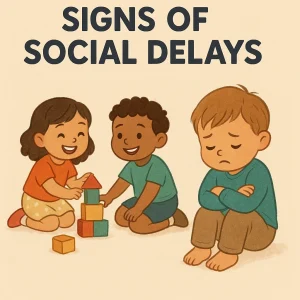Top Early Intervention Tips for Virtual Autism
Last Updated: September 24, 2024
Are you concerned about your child’s excessive screen time and its impact on their development?
Virtual autism, a growing concern among parents, can lead to delays in speech, social skills, and emotional regulation. Discover effective early intervention strategies to combat the effects of virtual autism and help your child thrive. Learn how to limit screen exposure, encourage face-to-face interactions, and provide engaging activities that foster healthy growth.
[youtube v=”TOoWqvX7T2A”]
What is Virtual Autism?
Virtual autism is a type of developmental delay that happens when young children spend too much time in front of screens and not enough time interacting with people and the world around them. Unlike traditional autism, which is influenced by genetic and neurological factors, virtual autism is more related to environmental causes, like prolonged screen time and less face-to-face communication.
Also Read: Virtual Autism: Things that you need to know
How is Virtual Autism Different from Traditional Autism?
While both virtual autism and traditional autism show some similar behaviors, such as delayed speech and social difficulties, the main difference is in the cause. Traditional autism is a lifelong condition that involves a mix of genetics and environment. In contrast, virtual autism is often reversible. By cutting down on screen time and using early intervention strategies, many children with virtual autism can show significant improvement.
How Screen Time Affects Virtual Autism
[youtube v=”j3B76imrJXY”]
In today’s world, screens have become a common tool to entertain children. From tablets to smartphones and TVs, many kids spend hours in front of screens. But too much screen time can get in the way of important developmental activities. Things like playing with toys, talking to parents, and interacting with other kids are crucial for learning language, emotions, and social skills.
When kids are glued to screens for long periods, they miss out on these essential experiences. As a result, they may become more withdrawn, develop repetitive behaviors, struggle to talk, or avoid eye contact—all behaviors often seen in children with autism.
Also Read: Managing Screen Time: Parental Tips for Preventing Virtual Autism
Common Signs of Virtual Autism
Children with virtual autism may show the following signs:
- Delayed Speech: The child may speak fewer words than expected for their age or struggle to form sentences.
- Poor Social Interaction: They may avoid eye contact, prefer playing alone, or have trouble understanding social cues.
- Repetitive Behaviors: They might repeat certain movements, like hand-flapping, or get overly focused on specific objects or screens.
- Emotional Outbursts: Children might have meltdowns, especially when screens are taken away.
- Less Interest in Real-Life Interactions: They may show little interest in playing with others or doing activities that involve human interaction.
Read more: Virtual Autism in Kids: Signs, Causes and How to Help
Understand Virtual Autism: Support Your Child
Worried about screen time? Discover how it impacts your child’s growth and learn simple ways to support healthy development every day.
Why Early Intervention Matters
Early intervention is crucial when addressing virtual autism. The earlier you step in, the better the chances of reversing or reducing its effects. For children in their developmental years, every interaction, game, or conversation can shape their cognitive and social skills. By acting early, parents and caregivers can help guide children back to a balanced routine that supports their growth.
Reversing or Mitigating the Effects of Virtual Autism
Virtual autism, which is caused by excessive screen time and reduced human interaction, can have long-term consequences if not addressed. However, many of its effects, such as delayed speech and limited social skills, can be reversed with timely intervention. Early intervention involves limiting screen exposure and encouraging activities that promote engagement, communication, and sensory experiences. By making these changes early on, you can prevent virtual autism from becoming a long-term issue and support your child’s natural developmental path.
Supporting Developmental Milestones
Early intervention is key to hitting important developmental milestones, particularly in language and social skills. When children are introduced to more face-to-face interactions, structured play, and communication exercises, they begin to catch up on the skills they may have missed. For example:
- Language Development: Early intervention helps improve speech and vocabulary as children engage in more conversations and reduce reliance on screens.
- Social Interaction: By promoting real-life activities and peer play, early intervention nurtures essential social skills like sharing, eye contact, and understanding emotions.
By acting early, you give your child the opportunity to build these skills at a pace that allows them to thrive in school and social settings.
Benefits of Starting Early for Both the Child and the Family
Starting early benefits not just the child, but the entire family. For children, the sooner they begin receiving support, the faster they can overcome the challenges associated with virtual autism. They learn to communicate better, express their feelings more clearly, and engage in meaningful social interactions.
For parents and caregivers, early intervention can ease concerns about a child’s development. It reduces stress by providing a clear path forward, complete with actionable steps to help their child succeed. When intervention is started early, families often see significant progress, bringing a sense of relief and hope for the future.
Top Early Intervention Tips for Virtual Autism
Early intervention for virtual autism is about making intentional changes that encourage growth and development in a balanced, engaging way. Here are some practical tips that can help you get started.
4.1. Limit Screen Time
One of the first steps in managing virtual autism is reducing the amount of screen time your child gets. While cutting down screens might seem challenging, small changes can make a big difference. Try setting daily limits for screen use and designate specific times for it, such as after school or in the evening, rather than allowing unrestricted access throughout the day.
To keep your child entertained without screens, introduce alternative activities like:
- Interactive Play: Engage in imaginative games or role-playing activities.
- Reading Together: Books are a great way to foster language development and creativity.
- Outdoor Activities: Encourage your child to spend time outside, playing games, exploring nature, or riding a bike.
Limiting screens helps children focus on real-world experiences that nurture their social, cognitive, and emotional growth.
Read more: Managing Screen Time: Parental Tips for Preventing Virtual Autism
Alternative Activities to Screen Time and Their Benefits
| Activity | Description | Benefits |
| Outdoor Play | Activities like running, playing tag, riding a bike, or exploring nature. | Improves physical coordination, boosts motor skills, and encourages social interaction. Helps with emotional regulation and reduces anxiety. |
| Reading Books | Reading picture books or storybooks together, allowing the child to follow along. | Enhances language development, improves vocabulary, and strengthens listening skills. Promotes imagination and empathy through storytelling. |
| Imaginative Role Play | Engaging in pretend play, like acting out a story, playing “house,” or pretending to be a character. | Boosts creativity, helps in understanding social roles, and enhances communication skills. Encourages problem-solving and emotional expression. |
| Art and Craft Projects | Simple DIY projects like drawing, painting, or making things with clay or paper. | Encourages focus and patience, boosts fine motor skills, and provides a healthy outlet for self-expression. Helps in sensory development. |
| Interactive Puzzles | Working on puzzles or building block structures together. | Strengthens cognitive development, improves problem-solving skills, and enhances memory. Promotes patience and attention to detail. |
| Music and Singing | Singing simple songs together or playing a musical instrument like a toy drum or piano. | Enhances auditory processing, builds language rhythm and vocabulary, and boosts memory retention. Also helps with emotional expression. |
| Sensory Play | Activities like playing with sand, water, playdough, or kinetic sand. | Engages the senses, calms anxiety, promotes focus, and encourages creativity. Helps in understanding texture, form, and sensory input. |
4.2. Encourage Face-to-Face Interactions
Direct communication is key to developing social skills, and it’s something that screens cannot replace. Simple face-to-face interactions, whether during family meals or playdates, help children learn how to read facial expressions, engage in conversation, and build emotional connections.
Here are some examples of how to encourage more face-to-face interactions:
- Engage in Conversations: Regularly talk to your child, even about small things like their day or their favorite activities.
- Playdates with Peers: Set up playdates where children can interact with others in a structured yet fun environment.
- Family Bonding Time: Plan family activities like board games, storytelling, or even cooking together. These moments foster real-life connections that screens can’t replicate.
4.3. Incorporate Structured Playtime
Structured play is an excellent way to promote language, cognitive, and social skills. This type of play involves planned activities with clear goals that challenge your child while keeping them engaged.
Here are some activities to incorporate into structured play:
- Building Blocks and Puzzles: These help improve problem-solving skills and hand-eye coordination.
- Role-Playing Games: Pretend games where your child acts out different scenarios can enhance their language and social understanding.
- Art and Craft Projects: Creative tasks encourage focus and fine motor skills while providing a fun, expressive outlet.
Structured play not only entertains but also provides valuable opportunities for learning in a natural, pressure-free way.
4.4. Engage in Sensory Activities
Sensory activities are highly effective in calming children and helping them engage with their surroundings. These activities can help children with virtual autism process sensory information better and promote focus and relaxation.
Some simple sensory activities include:
- Playing with Playdough: Let your child explore different textures by molding and creating shapes.
- Water Play: Splashing in water or playing with bubbles is a great way to engage the senses.
- Sand Play: Running their fingers through sand can be both calming and stimulating.
These activities can be done at home and often require very little setup, making them easy to integrate into your child’s daily routine.
Know more: 8 Engaging Sensory Exercises for Kids with Autism
4.5. Use Speech and Language Therapy
Speech and language therapy is an essential part of early intervention, even if done online through telehealth platforms. Many children with virtual autism struggle with language development, and guided therapy can help them improve their communication skills.
Some simple speech exercises you can try at home include:
- Reading Aloud: Encourage your child to repeat words or phrases after you while reading a book together.
- Singing Songs: Music can help build vocabulary and enhance memory.
- Interactive Questions: Ask your child open-ended questions to encourage them to express themselves in more detail.
Speech therapy, whether professional or done at home, can have a positive impact on language development and overall communication.
4.6. Promote Routine and Consistency
Establishing a consistent routine is vital for children with virtual autism. Routine provides a sense of structure and helps reduce anxiety, allowing children to focus on their activities without becoming overwhelmed.
Here are some tips for creating a daily routine:
- Set Fixed Times for Meals, Play, and Learning: A clear schedule gives your child a predictable structure, making transitions between activities smoother.
- Stick to Bedtime Routines: Consistent sleep patterns are essential for healthy development, so try to keep bedtime at the same time each night.
- Use Visual Schedules: Simple charts or picture schedules can help your child understand what to expect throughout the day.
Professional Support
While parents and caregivers play a crucial role in early intervention, professional support is often essential for navigating the more complex aspects of virtual autism. Seeking guidance from professionals like developmental pediatricians, therapists, or counselors can provide you with expert insights and personalized strategies that fit your child’s unique needs.
When to Seek Professional Guidance
If you notice that your child’s speech, social, or behavioral challenges persist despite efforts at home, it may be time to consult a professional. Speech therapists, occupational therapists, and counselors can work with your child to address specific areas of concern, such as communication, social skills, and emotional regulation.
The Role of Telehealth and Digital Platforms
In today’s digital age, accessing professional support has never been easier. Telehealth platforms allow you to connect with therapists and specialists from the comfort of your own home, making it convenient for families to get the help they need without worrying about travel or scheduling conflicts.
Digital tools like Tele-BASICS, available through platforms like Wellness Hub, can also provide valuable resources for early intervention. These platforms allow therapists and families to collaborate in real time, offering interactive and engaging ways to implement strategies during therapy sessions and at home.
Conclusion
Starting early with intervention strategies for virtual autism can make a big difference in your child’s development. Reducing screen time, encouraging face-to-face interactions, and engaging in activities like sensory play or structured games can help your child catch up on important skills. Staying consistent with these strategies is just as important. By creating a routine and reinforcing positive behaviors, you’re giving your child the support they need to thrive.
If you feel extra support is needed, don’t hesitate to seek professional guidance. Tools like Wellness Hub’s Tele-BASICS offer easy access to therapy and early intervention resources from the comfort of home. Remember, with the right approach and consistent effort, virtual autism can be managed effectively, helping your child grow and develop at their own pace.
Frequently Asked Questions:
1. What is virtual autism?
Virtual autism is a form of developmental delay in children caused by excessive screen time and limited real-world interaction. Unlike traditional autism, it can often be managed or reversed with early intervention strategies such as reducing screen time and encouraging social engagement.
2. How can early intervention help with virtual autism?
Early intervention plays a key role in addressing virtual autism. By reducing screen time, promoting face-to-face interactions, and incorporating sensory play, children can regain important social, language, and cognitive skills.
3. What are some early intervention tips for virtual autism?
Some effective early intervention tips include limiting screen exposure, engaging in structured playtime, encouraging direct communication, using sensory activities, and seeking professional support like speech therapy or telehealth services.
4. How can I reduce my child’s screen time to manage virtual autism?
You can reduce screen time by setting daily limits, introducing alternative activities like outdoor play, reading, and interactive games, and ensuring regular face-to-face interactions with family members or peers.
5. Why is it important to involve parents and caregivers in early intervention?
Parents and caregivers play a crucial role in reinforcing early intervention strategies. Their involvement ensures that children get consistent support and encouragement, which is essential for positive developmental progress.
6. When should I seek professional support for virtual autism?
If your child continues to experience speech, social, or behavioral challenges despite early intervention, it may be time to seek professional support. Experts like developmental pediatricians, therapists, or counselors can provide personalized strategies to address specific needs.
7. Can telehealth services help with virtual autism?
Yes, telehealth platforms like Tele-BASICS by Wellness Hub offer convenient access to therapy sessions and resources, allowing parents and children to receive professional support from home.
8. Can virtual autism be reversed with early intervention?
In many cases, the effects of virtual autism can be significantly reduced or even reversed with early intervention strategies, especially when they are implemented consistently and at an early stage.
9. How does structured play help in managing virtual autism?
Structured play helps by providing children with clear goals and engaging activities that promote language, social, and cognitive development. Games like building blocks, role-playing, and art projects encourage interaction and problem-solving, which are crucial for overcoming the challenges of virtual autism.
10. How does a consistent routine benefit children with virtual autism?
A consistent routine provides stability and reduces anxiety for children with virtual autism. It helps them know what to expect throughout the day, making it easier to engage in activities and learn new skills. A set routine that includes play, learning, and social interactions supports developmental progress.
About the Author:
Anuradha Karanam
Speech-language pathologist (7+ years of experience)
Anuradha Karanam is a skilled speech-language pathologist with over 6 years of experience. Fluent in Tamil, Telugu, Hindi, and English, she specializes in parent counseling, speech sound disorders, fluency assessment, and speech-language evaluations. Anuradha excels at working with children with developmental disorders, offering creative and effective therapy programs. Currently, at Wellness Hub, she holds a BASLP degree and is registered with the RCI (CRR No A85500). Her patience, ambition, and dedication make her a trusted expert in her field.
Book your Free Consultation Today
Parent/Caregiver Info:
Client’s Details:
* Error Message









